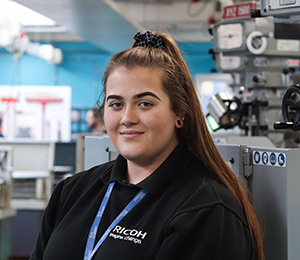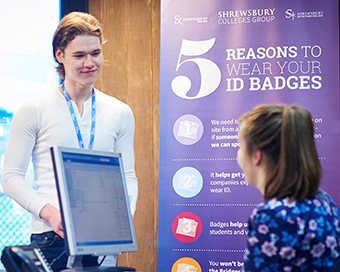HNC/HTQ Modules in Electrical and Electronic Engineering for England
| Mode of study | HE Part-time |
| Duration | 16 Weeks |
| Campus | London Road Campus |
| Start date | 22 January 2025 Please note that day of week is just an indication at this stage and could be subject to change |
| Course code | PLR4HEE (2425B) |
Need help? Submit your details and someone from our team will be in touch to help you with any questions on anything from course content to financial advice.
This short higher-level programme focusses on:
Mechatronics
Auto-focus cameras, car cruise control and automated airport baggage handling systems as examples of mechatronic systems. This unit looks at Mechatronics as the combination of mechanical, electrical and computer/controlled engineering working together in automated systems and ‘smart’ product design.
Electrical Systems and Fault Finding
Electrical systems that can be found in a very wide range of locations such as in manufacturing facilities, airports, transport systems, shopping centres, hotels and hospitals, in the workplace and at home. Focus is on the taking the electrical supply from the national grid, converting it to a suitable voltage and then distributing it safely to the various system components and uses such as electric motors, lighting circuits and environmental controls.
-
Who is it for?
This 15-week part-time course is aimed at those wishing to further their academic qualifications and enhance their career opportunities within the engineering industry. The purpose of Pearson BTEC Higher Nationals in Electrical and Electronic Engineering for England is to broaden employees' knowledge in anticipation of the fast paced technological advances in this industry.
-
Entry Requirements
All applicants are individually assessed on their qualifications, skills, and experience. You should have the desire to further your career in the engineering Industry and hold either a Level 3 NVQ Diploma or BTEC Level 3 Diploma in Engineering, a BTEC National Award or A Levels or equivalent. Applicants should also have GCSE Maths and English (or equivalent). If the applicant has the necessary experience within professional roles but not the appropriate qualification, then this will be assessed on evidence of work history.
-
What does the course involve?
Unit 4006: Mechatronics - among the topics included in this unit are: consideration of component compatibility, constraints on size and cost, control devices used, British and/or European standards relevant to application, sensor types and interfacing, simulation and modelling software functions, system function and operation, advantages and disadvantages of software simulation, component data sheets, systems drawings, flowcharts, wiring and schematic diagrams.
On successful completion of this unit students will be able to explain the basic mechatronic system components and functions, design a simple mechatronic system specification for a given application, use appropriate simulation and modelling software to examine its operation and function, and solve faults on mechatronic systems using a range of techniques and methods.
Unit 4026: Electrical Systems and Fault Finding - this unit introduces students to the characteristics and operational parameters of a range of electrical system components that are used in a variety of applications; and how to fault find when they go wrong.
On successful completion of this unit students will be able to follow electrical system circuit diagrams, understand the operation of the various components that make up the system and select the most suitable fault-finding technique. Therefore, students will develop skills such as critical thinking, analysis, reasoning, interpretation, decision making, information literacy, information and communication technology literacy, innovation, creativity, collaboration, and adaptability, which are crucial skills for developing academic competence for higher education progression.
The below link will take you to further information. By opening this site, you can then search on Units 4006 and 4026:
Unit Descriptors for the Pearson BTEC Higher Nationals Engineering Suite
-
How is the course assessed?
Your work will be continually assessed throughout this flexible and blended programme. Attendance will be required at key points during the 15 weeks with online support and resources available throughout.
-
How much does it cost?
This programme is fully funded by the Department for Education for students who are resident in England.
-
What do I do next?
You can apply online via the APPLY NOW button. If after reading this factsheet you are still undecided, please drop into one of our Advice Events, ring Admissions on 01743 653111 or email This email address is being protected from spambots. You need JavaScript enabled to view it.

Austin Luzadas
Level 3 in Engineering
Previous school: Holy Trinity School, Telford
Level 2 was mostly practical and this year on Level 3 there is a lot of theory and it's preparing me for university. I live outside of Shrewsbury and the transport links to the College are good.

Samantha Pitchford
Level 2 Fabrication and Welding
Previous school: Charlton School
I’m a practical person, so I wanted to do something with my hands. I didn’t have any experience before, but the teachers were really good at guiding me through. I’m a bit of a perfectionist, so the fact that the staff let me work to my own pace really helped. I have now secured an Apprenticeship with Caterpillar in Shrewsbury, and I can see myself being there for some time. I’m sure it wouldn’t have happened unless I’d been on this course as at my interview they seemed really impressed with what I was doing.

Chloe Millington
Engineering Apprentice at Ricoh
I studied Product Design at A Level and really enjoyed it. Taking on an Engineering Apprenticeship seemed like the natural progression from that, and I’ve appreciated every minute of it. It is great working for Ricoh and being able to study at SCG, as I get so many opportunities, such as taking part in WorldSkills.

Gemma Elliot
Foundation Degree in Electrical and Electronics Technology
Previous Institution: Llanfyllin High School
My Foundation Degree is funded by the engineering firm James Fisher. I’m learning so much and absolutely loving it.
Career Options
Are you an employer?
See how an apprentice can help your business.








